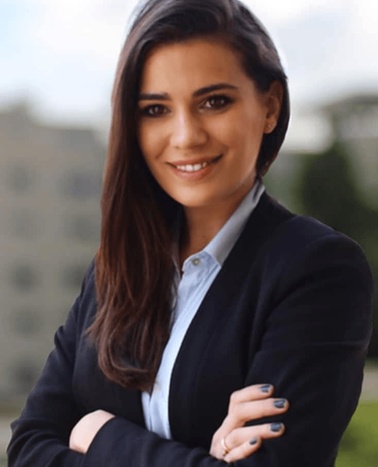
Pilar Fernández
Pilar Fernández is a student in the Master in Global Taxation. She completed a Bachelor’s Degree in Business Management and prepared for official exams in order to become a State Treasury Inspector: her professional goal was to focus in domestic tax law and work for her country as a civil servant. However, launching her career hasn’t been an easy journey, until now. Months before graduating from the Master in Global Taxation, Pilar landed her dream job as a Tax Associate at PwC.

"I enjoy reading, not books, but all kinds of news. Information is key and I love the idea of being able to manage myself in every possible situation."
Although she is working in a “Big Four”, the journey towards her landing the job she always pursued hasn’t been easy. “Spain was in the midst of a global financial crisis and the labor market wasn’t demanding enough job positions for all graduates, so I decided to continue my education, but I had no luck. I didn’t get my spot in the tax administration and all of the sudden I was 30 years old with no previous job experience in the field. It was tough trying to focus my career into something else after all those years studying. My dream job of working in a tax consultancy firm was vanishing right before my eyes. I just didn’t fit the standard profile they were looking for,” recalls Pilar.
In this interview, Pilar reveals how she landed her dream job, her personal views on the profession, and what she is learning from her experience at IE.
Why did you decide to do the Master in Global tax at IE?
I had friends working in top law firms with promising careers who had previously studied a Masters in Law (LL.M.) at IE Law School. At this moment of my life, I was applying to every tax-related job position in Madrid but I wasn´t getting there. So I figured: What if I could focus all my knowledge in a Master’s Degree in one of the top-level Law Schools in the world and finally receive acknowledgement.
I found out that IE was launching a new Master in Global Taxation. It was different, it was up-to-date and it was challenging. I took a look at the program and it literally looked like the future in the tax world. Other than the program, I knew it was also an opportunity to learn from the best and do some networking.
I thought IE could add real-world experience in international tax to my CV and make it standout from the rest and gain the attention of big law firms. I wasn’t wrong.
What are your professional goals?
I focused on getting into a big consultancy firm: PwC, Deloitte, KPMG or EY. What I love about these companies is that they have resources to promote your professional career once they notice your talent. I thought that, after all the years studying, I was late in my career and I would have to start from scratch. However, I was wrong.
All the expectations I had before the Master are becoming reality, even before graduating. I got my dream job as a Tax Associate in PwC.
My professional goal is to lead international tax planning transactions, travel the world and work with the best international tax lawyers. Once I gain experience, I would really like to teach taxation in a business school.
What do you enjoy most about your profession?
I love how challenging the consultancy industry is. You have to be up-to-date in a world in constant evolution, where borders are vanishing when it comes to business. In this context, every case is different and every client has a different need. We, as tax professionals, have the responsibility to adapt tax planning to corporate planning. In the end, taxes matter and we cannot oversee the fact that taxes are linked to wealth and prosperity, which is why I believe businesses should lead all modern tax planning schemes.
Taxes are everywhere; they are certain and everyone has this burden. We should all contribute with the economy in a fair way, which I think is a beautiful goal we should all pursue.
You are in a very classroom with classmates from all over the world. Do you find cultural difference s in the approach to the tax law? If so, what are they and how do you these differences enrich the learning experience?
You can definitely see the difference in taxation between civil law and common law countries. In global taxation, advisors are fighting double taxation, whereas tax administrations are fighting double non-taxation. In both schemes, different rights and duties come into play. What is different is the way jurisdictions legislate them. At the same time, there are some common principles coming from international organizations trying to put some sense in cross-border transactions in order to levy taxes right where the business value is created.
Still, there is little harmonization. Knowing different tax systems is essential in order to have a broader view of tax planning schemes, because the source of the income may reclaim some taxing rights. To understand global taxation you must know principles, tax relief mechanisms, anti-avoidance measures or dispute resolution procedures… and only international treaties make that possible.
What are the main challenges that professionals working in the tax sector face?
After OECD BEPS, there is some uncertainty in the industry. It is soft law, but is still setting some standards that in some cases will be implemented through statutory law, and in other cases, will change the way we think of tax planning. Is traditional tax planning dead? Well, in a way it is. All major undertakings around the world are being scrutinized and challenged by tax authorities if they don’t pay a “fair” amount of taxes. Whenever there is a business tax-driven scheme, there is always a chance that the Courts apply some anti-avoidance measures. There is legal uncertainty as to which point tax benefits enforced in tax law are durable anymore. And yet, because taxes minimize the money in our pocket being an additional cost both for individuals and corporations, it’s only natural to be aware of them. However, business needs to be the leading purpose behind any tax scheme. Multi-nationals shall be safe if they operate under valid economic reasons.
Another big challenge for global taxation is considering to which point foreign people and corporations can be treated any different from tax residents when doing cross-border business. Today, Domestic Tax Law is not enough. There are organizations, political and economic unions with common principles, bilateral or multi-lateral treaties, and they always come first; they look for harmonization, and yet it is very challenging for tax advisors and tax administrations to allocate the taxing rights when more than one country is involved.
What are your hobbies?
I enjoy reading, not books, but all kinds of news. Information is key and I love the idea of being able to manage myself in every possible situation. With the internet and social media, we can access all types of information, which fascinates me. I specially like watching TV shows and series, which, in my view, are a great tool to deal with stress and switch off our minds before going to bed.
Finally, I enjoy cooking and walking down the streets when the weather is nice and sunny. In spring, daylight extends past 9 pm, allowing you to seize the day and enjoy your free time after work or class.
What do you highlight from your experience (so far) at IE? Have you engaged in extracurricular activities (inside IE)?
If I have to highlight something about IE, it is the methodology. It’s quite different from what we all experienced at university, especially in Spain. At IE, you get to talk and you learn that not everything is black or white. You’re never totally right or totally wrong and that makes you see the importance of reason. It is an open-minded environment where professors provide you with the best tools to form an opinion and criteria and to stand by it.
We come to class and put in common different pieces that end up completing the puzzle. It’s an enriching experience where you learn to respect everyone in your team, because there is always something someone is always good at. And, when working in groups, it's key to find out who does what best.
The IE management team is always looking for extracurricular activities that are very useful for developing new skills in different fields. There are diverse professional and social communities to network and the staff is always there to guide you through the experience. You end up with a clearer idea of how to focus your career.
Tell us about the NYU experience week.
It is the perfect opportunity to get to know one of the top taxation universities in the world. Thanks to the experience we learned the basics of tax reform recently passed in the US Tax Cuts and Jobs Act. It was also a great networking opportunity, as we attended different events that allowed us to network and meet people from different parts of the world. The exchange was enriching, at all levels, and intense, but we also had the opportunity to schedule extra-academic activities and enjoy New York City.